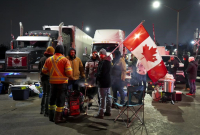Support strong Canadian climate journalism for 2025
OTTAWA — MPs heard Thursday that Canada's financial intelligence hub doesn't cover crowdfunding sites such as GoFundMe, as political leaders try to make sense of the millions flowing to protesters blockading the national capital.
Fintrac deputy director Barry MacKillop appeared before a House of Commons committee on public safety and national security at the request of MPs studying crowdfunding platforms and the financing of extremism.
Its mandate is to identify money linked to terrorist financing and money laundering from reports it receives each year from entities including banks, insurance companies, money service businesses and casinos. It doesn't investigate potential crimes or stop money from flowing, but passes its intelligence onto police.
The probe by the all-party panel of MPs is happening in light of a well-financed protest on Parliament Hill that local police and political leaders say has turned into a siege.
Two weeks ago, hundreds of semi-trucks rolled into downtown Ottawa to protest COVID-19 vaccine mandates and health restrictions. Many have refused to leave and their idling trucks have continued to clog up streets around the parliamentary buildings and force surrounding businesses to shut their doors.
Donors raised more than $10 million for the protesters through GoFundMe, which announced last Friday it was pulling the plug on the campaign and that the money would be refunded.
The site said it initially believed the demonstration was going to be a peaceful event, but withdrew its support once it realized it had become an "occupation" and after police and local leaders raised concerns.
Convoy organizers quickly set up a new campaign on Christian fundraising site GiveSendGo, which had raised US$8.2 million as of Thursday.
MacKillop testified that Fintrac doesn't regulate crowdfunding sites like GoFundMe and so wouldn't receive from it reports of suspicious transactions.
The payment services that users rely on to send money to crowdfunding campaigns, like PayPal, and the banks that in turn deposit the cash do fall under is reporting requirements, the MPs heard.
"The intersection with the crowdfunding platforms and our financial institutions is a must in order to disperse the money," he said.
"If the money were going through a Canadian bank, for example, and directed to the Proud Boys — they're a listed terrorist organization. That money would be stopped by the bank."
Annette Ryan, another deputy director at Fintrac, testified this gives them a line of sight into the crowdfunding sector.
At the outset, MacKillop said Fintrac doesn't discuss intelligence disclosures made to police. But when it comes to the protest unfolding in Ottawa, he said there hasn't been an upswing in suspicious transactions being reported.
"We have not seen a spike," he said.
Among one of the questions MPs had about the millions being generated for protesters through crowdfunding sites was the appearance funds were being sent anonymously.
MacKillop says while the public may not get to see who is making donations, that doesn't make them anonymous.
He pointed out donors must use credit cards to send money and the fact that GoFundMe offered up refunds after it shut down the protesters' campaign demonstrates it has the information it needs to identify an individual.
Earlier Thursday, NDP MP Alistair MacGregor announced the committee would hear directly from representatives from GoFundMe about what measures it has in place to prevent the funding of extremism.
MacGregor brought forward the motion and said they will appear March 3.
This report by The Canadian Press was first published Feb. 10, 2022.





Comments